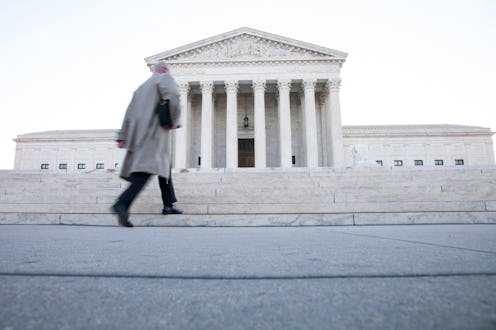News
Arkansas Could Be Left With Just One Abortion Clinic After This Supreme Court Move

Planned Parenthood's fight against an Arkansas abortion law that could leave the state with just one abortion provider just hit a major road block. The Supreme Court won't hear the Arkansas abortion case, the court announced on Tuesday. Although Planned Parenthood can continue challenging the law, which also effectively bans medication abortions, in district court, its restrictions will go into effect in mid-July.
"Arkansas is now shamefully responsible for being the first state to ban medication abortion," said Dawn Laguens, executive vice president of Planned Parenthood, in a Tuesday statement. "This dangerous law also immediately ends access to safe, legal abortion at all but one health center in the state. If that’s not an undue burden, what is?"
The Arkansas law in question says that any doctor who provides or prescribes abortion medication must have a contract with a physician who has admitting privileges at a nearby hospital. That physician would agree to handle complications, should they arise.
Planned Parenthood argued that the law is similar to a Texas measure that the Supreme Court ruled unconstitutional in 2016. The Whole Woman’s Health v. Hellerstedt decision stated that Texas laws requiring doctors who provide abortions to obtain admitting privileges at a nearby hospital, as well as requiring clinics to meet the same standards as ambulatory surgical centers, were undue burdens on a woman's right to a legal abortion.
The court didn't comment Tuesday on its decision not to hear the Arkansas case, but Planned Parenthood has said the law could cause two of the state's three abortion clinics to close.
One of the affected clinics is in Fayetteville, located in northwest Arkansas. Fayetteville women will have to travel 400 miles round-trip to a Little Rock clinic in order to obtain an abortion if their local clinic shutters. This would create a major barrier for low-income women, women who can't arrange child care, and women who can't take time off work to travel across the state, Planned Parenthood argued.
"Many low-income women already strain to access and afford abortion services, and low-income women have fewer resources to overcome the burdens that diminished access to abortion providers would impose," Planned Parenthood argued in a 2016 court document. It also noted that low-income women experience the highest rates of unintended pregnancy, meaning longer travel times to clinics would disproportionately impact the women who need access to abortion the most.
Mifepristone and misoprostol — known as the abortion pills — are used to end pregnancies early on. They are approved for use by the FDA up to 10 weeks of pregnancy, and the FDA allows physicians and midlevel providers, such as nurse practitioners and physician assistants, to administer the drugs. Less than 1 percent of people who got medication abortions at Planned Parenthood between 2009 and 2010 experienced a serious side effect or incomplete abortion, according to a 2012 Princeton University study.
Just as the Whole Woman’s Health v. Hellerstedt decision determined that doctors don't need admitting privileges at nearby hospitals in order to perform abortions, Planned Parenthood says doctors don't need admitting privileges to administer abortion medication. The organization plans to continue fighting what it considers an undue burden on women's right to abortion in district court.
"This law cannot and must not stand," Laguens said. "We will not stop fighting for every person’s right to access safe, legal abortion."
It's still possible that the Arkansas law could be blocked before it takes effect later this summer. But its fate now lies in the hands of a district court judge — not the Supreme Court justices who struck down similar Texas abortion restrictions two years ago.